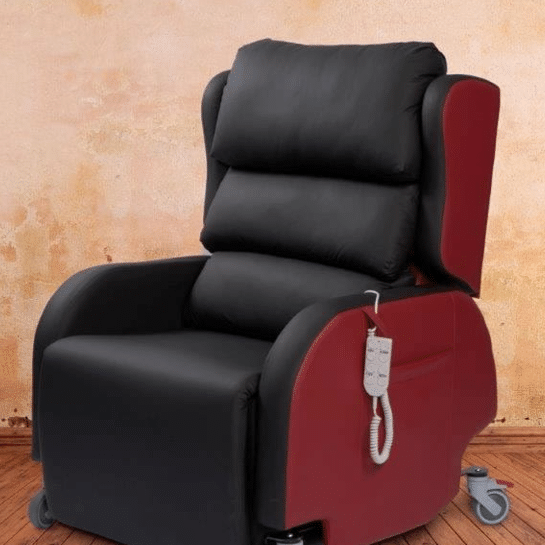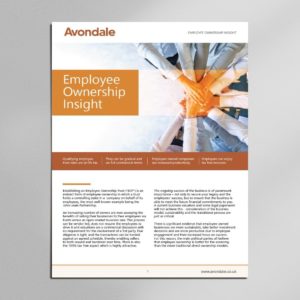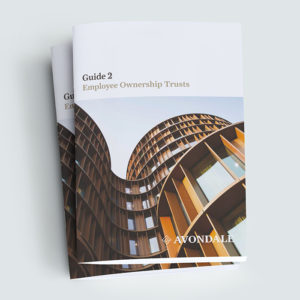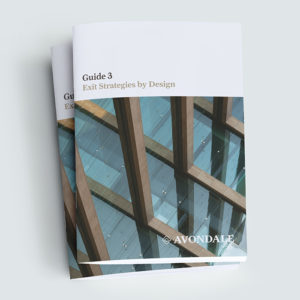Your Employee Ownership Trust Experts
An Employee Ownership Trust requires careful consideration and planning. Avondale can lead the whole EOT structuring process, including the application for HMRC approval, and additionally provide transitional support, assist with any third-party funding requirements and work with you to determine the critical aspect of leadership succession in preparation for when you exit the business.
We offer a personal service which maximises value, establishes the best transition process and reduces the complexities for you and your team. Financing for the EOT is through a combination of excess cash on completion, vendor loan notes and sometimes third-party finance. The valuation of the business is vendor and advisor-led and is determined by your business’ forecasted cash flow and reserves.
Our expert advisors undertake a complete financial and commercial analysis of your business, which includes detailed financial modelling to value the business and create the most suitable EOT structure. They will also assess key management capabilities and the best handover approaches. This will help you to better understand how an Employee Ownership Trust might be the best exit strategy to achieve your goals compared to alternatives, such as Management Buy-Outs (“MBO”) or the archetypical trade sale.
Avondale craft and submit a detailed clearance request to HMRC and finalise the funding structure of the EOT. Where relevant we will secure third-party debt funding using our extensive network of specialist EOT lenders, securing the most appropriate terms and debt serviceability.
Avondale provides a full legal pack for an arm’s length sale and will walk you through each of these documents in a series of meetings to ensure that you understand all the technicalities and that your sale is kept on track. Concurrently with the legal process, we create the change management strategy for your team to ensure a seamless succession.
An EOT business sale currently attracts 0% Capital Gains Tax and can achieve full commercial value for your business. The EOT company is a regular limited company run on commercial terms but with the shares owned by a trust for the benefit of all the employees. For your EOT we will use a new trust company limited by guarantee, so it does not have shares or shareholders, which protects employees from liability. The EOT structure facilitates employee mobility without share transfers, thereby reducing future succession issues.
One of the key benefits of an EOT is that the existing company culture is maintained whilst enabling you, if required, to step back over time. With the ability to give qualifying employees up to £3,600 per annum as a tax-free bonus, EOTs aid recruitment and retention of quality staff, increased productivity and local investment.
Transitioning to employee-ownership results in most companies being run in a more transparent way, with support for a team that is driven and committed to the future of the business and all eligible employees being rewarded with an annual profit share. Employee-owned businesses are proud to be part of a growing movement of progressive businesses putting people first.
Recent Employee Ownership Trust Completions
Why sell to an Employee Ownership Trust?
Employee Ownership Trust businesses are not new – John Lewis is probably the oldest example, but many owners are now choosing this exit route as there are many advantages. In particular:
- EOT sales are highly attractive because, subject to HMRC clearance, they are 100% free of Capital Gains Tax. The Government is incentivising these sales as there is significant evidence that EOT businesses are sustainable and lead to greater productivity.
- There are benefits for the employees: tax-free bonuses, better job security, and a feeling of inclusiveness.
- The process can be vendor-led, and employees are not required to drive the approach as would be the case in an MBO.
- They are more immediate and require less due diligence than trade sales.
What is the sale approach?
An EOT sale does not mean that the business has to become wholly run by the employees. The former shareholders can remain involved at management level; although they concede board control of the business to the Trust they can take a position as a Trustee after the sale. The key points of the EOT approach are:
- The sale must be for 51% or more of the company shares to benefit from the 0% CGT rate. Many EOT sales are 100% share sales for simplicity.
- Typically a new company is created which will act as the employee share ownership trust and the shareholders sell their trading business shares to this EOT company.
- A sale and purchase agreement is executed, although associated due diligence is typically lighter.
- After the sale, the company trades as a wholly-owned subsidiary of the EOT company.
- A trust document sets out the obligations of the Trust to the employees.
- The fixing of the multiple used to value the trading company is a commercial discussion and there is no golden rule.
How will my business be valued?
Typically, private company valuation multiples range between 4 to 7 but cashflow, financial headroom and reserves will all have a bearing. The valuation, which will be led by Avondale, is subject to HMRC clearance and will be assessed using comparisons with other private sale benchmarks.
How will the sale be funded?
There are three ways for the Trust company to fund the buy-out – company reserves, vendor loans (typically over 5-7 years from our experience), and sometimes third-party debt is also used. Financial aspects to consider:
- Any debt or vendor loans are structured in much the same was as a management buy-out from future cashflow (profit after tax) – analysing seasonality and the headroom to pay debt plus interest from the income.
- Owners’ salaries are sometimes adjusted at the point of sale.
- The trade company will make payments out of profits after tax on the vendor loan to the EOT company which will then repay the selling shareholders.
- The vendor loan is often a ‘promise to pay’ and therefore may not sit on the balance sheet. From a practical perspective this means that if cash flow is struggling, the loan period can be extended.
- Interest on vendor loans must be charged to ensure that there is an incentive for management and Trustees to repay the loans on schedule.
- Dividends can be restricted until all vendor loans or third-party loans are paid off.
- The vendor loans are typically structured as loan notes secured against the business.
- Any initial payout from reserves needs to leave sufficient working capital.
- Any third-party debt may need personal guarantees from the sellers and will take precedent over the vendor loans in terms of repayment. The trust needs to approve reasonable finance terms.
What happens to the employees?
Employees are usually highly motivated by employee ownership. They like the inclusivity and cultural approach that it brings to the company and their roles. It also benefits the recruitment process. Many employees also see that beyond any debt repayments the business can scale-up as the ongoing dividend requirement is lessened/eradicated. Typical benefits include:
- Following debt repayment, pay for key managers is typically in the upper quartile for the sector.
- Increased retention.
- Better productivity as staff increase the ‘stakeholder’ mindset.
- Tax-free bonuses of up to £3,600 per annum for each employee, typically from year one.
- The sellers can remain employees and gradually handover the reigns over-time, as appropriate.
- Strategy and culture can often be reset with increased team-driven initiatives.
- The trust acts in the best interests of the beneficiaries – the employees.
- Usually, there is a professional trustee, an employee trustee and an ex-shareholder trustee. Avondale will help establish your trust panel as part of its service approach.
What are the next steps?
All EOT sales are bespoke as the approach is highly flexible. It typically takes Avondale 3-4 months to complete an Employee Ownership Trust, working directly with the sellers on a one-to-one basis on all aspects from feasibility, finance and clearance to strategy and the establishment of the trust panel.
With significant expertise in valuing businesses, cash flow modelling and gaining HMRC clearance, we are unique in the EOT market as we also have in-house hands-on expertise to lead the EOT cultural transition within a business. We believe Employee Ownership Trusts should be completely commercial in terms of the return to the seller shareholders, and then on the sale, the business should become an employee-driven strategically advantaged business.
Employee Ownership Sales with Avondale
We are the only advisor providing a turnkey solution that covers all aspects of an EOT from start to finish, maintaining personal services throughout. Contact us today to discuss how employee ownership could work for your business.
Can EOTs be resold and what is their purpose?
Employee-owned businesses can thrive commercially, but they differ from traditional equity-based models. Rather than focusing on resale or short-term shareholder value, the emphasis should be on long-term sustainability through better team alignment, increased salaries, and enhanced benefits. Promising employees equity that may never be realised can cause dissatisfaction; instead, tangible rewards such as bonuses, healthcare, and insurance are key to motivating employees.
Employee ownership is a long-term strategy, not a quick financial gain. Shifting focus away from price earnings, multiples, and potential resales helps avoid distractions for management. While there are now nearly 2,000 employee-owned businesses in the UK (up from 1,700 – 2023), very few have been resold. Why?
Can an EOT Be Resold? Technically, an EOT cannot be sold at the Trust level, but it can sell shares in its trading company so yes, an EOT business can resale. However, this is very rare as key factors make such resales unappealing:
- Loan Repayment – The sellers’ loan note must be fully repaid before a sale, or their approval is required.
- Trustee Oversight – Trustees control the sale decision, prioritising employee interests over ex-sellers or management.
- Cultural Shift – Buyers are wary of transitioning an EOT back to a conventional structure.
- Tax Consequences – The tax regime is punitive to discourage resales. The capital gains tax (CGT) exemption is a deferral. Upon resale, CGT applies at the prevailing rate. Any remaining proceeds distributed to employees are subject to income tax, leading to a potential 80% combined tax charge.
Despite these challenges, a sale might still be worthwhile if there is significant value uplift and the loan note is nearly repaid. However, buyers may hesitate due to risks such as employee attrition after receiving substantial payouts.
In conclusion EOTs are not ‘true’ share schemes; they more resemble mutuals focused on long-term stability and employee benefits. Redirecting efforts toward improving team rewards, training, and business planning ensures that employee-owned businesses remain sustainable and grow without the distraction of shareholder value concerns. Like a home meant for living rather than investment, an EOT is an evergreen business designed to endure and thrive. Same business, better model.
Our Employee Ownership Specialist Lenders




Resource Centre
Guides & Insights
With an increasing number of owners now assessing the potential of selling their businesses to their employee, our Employee Ownership Insight examines the key advantages of employee ownership sales and answers the most frequently asked questions by business owners and management teams, such as:
- Why sell to an Employee Ownership Trust?
- Who will my business be valued?
- How will the sale be funded?
Our Employee Ownership Trusts Guide is written to help business owners and management teams gain an in-depth understanding how an EOT may help shareholders create succession and secure shareholder value, whilst creating the legacy of a sustainable business working for the benefit of all staff members. Topics covered include:
- Advantages, Benefits & Considerations of Employee Ownership
- Forms of Employee Ownership & Funding the Transaction
- Practicalities of Distributable Reserves & Implementation
Set against a number of case studies, our Exit Strategies by Design Guide examines the different exit options available for business owners and shareholders, together with key elements to consider, such as preparation for the sale, valuation and timing. Topics covered include:
- Detailed Overview of Possible Exit Strategies
- Types of Buyers
- Business Cycles & When to Exit
Articles
On-Demand Webinars
Our on-demand webinars are led by accomplished speakers and professionals covering all aspects of employee ownership sales. Bringing together specialist EOT advisors, trustees and ex-sellers, topics of discussion include the pros and cons of employee ownership, transaction steps, the cruciality of successful transition and life of previous owners after the sale.


























